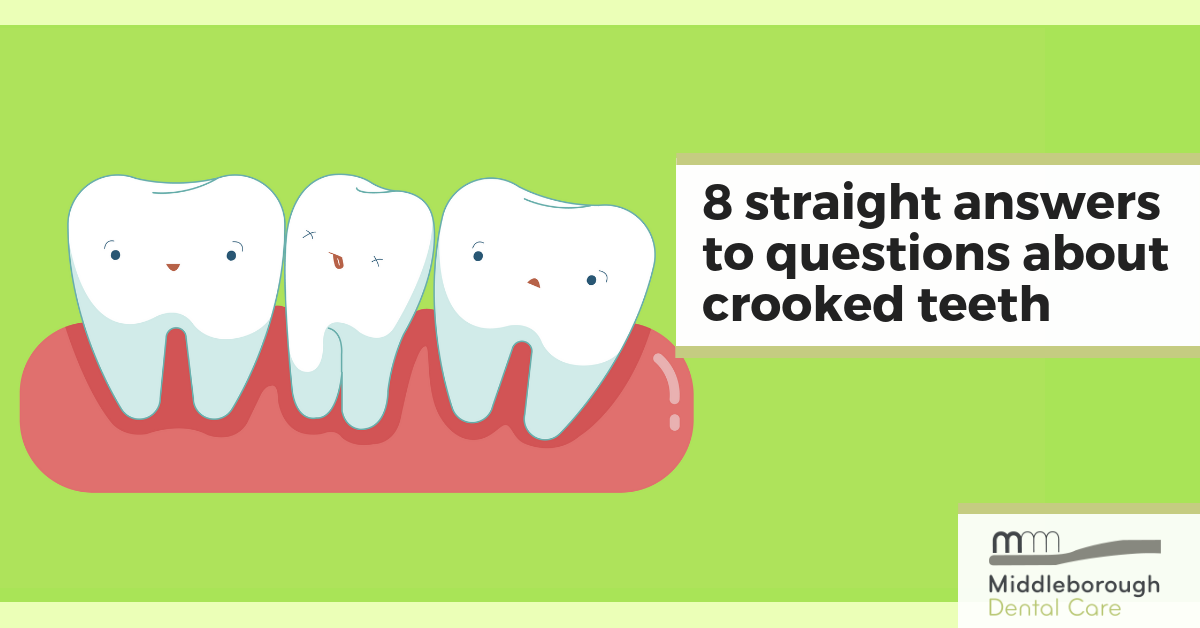
8 straight answers to questions about crooked teeth
If we weren’t already genetically attuned to be attracted to a dazzling smile, our celebrity-driven culture has done a pretty good job of making a perfectly straight, perfectly white set of teeth one of the leading measures of a person’s attractiveness – and something many of us aspire to.
That’s why, as we outlined in a previous blog post, Even celebrities go to the dentist.
Important as it may be to be happy with the way your teeth look and confident enough to smile easily, there are also some significant health-based reasons that we should keep our teeth as straight as possible.
Of course, when we use the term ‘straight’ in regard to teeth what we really mean is ‘well aligned’, because it’s the way your teeth come together that matters most.
-
What health effects can crooked teeth have?
If your teeth become misaligned, that can be a direct cause of a range of issues, including excessive, premature wear to your teeth and jaw, discomfort, and even TMJ disorder.
Crooked teeth and misaligned bites can interfere with proper chewing, make keeping teeth clean more of a challenge (which increases the risk of tooth decay, cavities, and gingivitis), and strain the teeth, jaws, and muscles (which can increase the risk of breaking a tooth).
-
Can permanent teeth come in crooked?
If a permanent tooth starts pushing through prematurely, before the primary tooth has become loose enough, that could cause an alignment issue.
However, don’t be concerned if your child’s front permanent teeth angle away from the centre when they come through (usually first), as they should straighten up naturally as the other permanent teeth come in.
It’s also worth knowing that if primary tooth is misaligned or twisted, there is no link to the alignment of the permanent tooth that will replace it.
-
If a primary tooth is missing, will that impact on the permanent tooth?
If a child loses a baby tooth early, through an accident or decay, the surrounding teeth will space out to fill the empty space. This is likely to cause some issues when a permanent tooth tries to come through in a spot that no longer aligns and/or where the space for it is limited.
-
Does tooth malalignment impact on gum health?
Crooked teeth can lead to periodontal (gum) disease because when your gums don’t fit securely around your teeth there is more room for bacteria to grow – and your teeth and gums are harder to keep clean. When bacteria in our mouth forms into plaque, it’s the beginning of gum disease.
-
Can a blow to the jaw make teeth crooked?
Facial trauma – a severe blow or other injury to the face or jaw – is one of the most common causes of crooked teeth.
A jaw or mouth injury can certainly move teeth out of place, sometimes subtly enough that it’s not obvious without a thorough examination.
-
How does a missing tooth affect the other teeth?
If an adult tooth is missing and there is a gap, there is a good chance the neighbouring and opposing teeth will move to compensate.
Any unwanted tooth movement is likely to result in bite problems, with potential discomfort and, eventually, some longer-term consequences.
-
Can my habits cause my teeth to become misaligned?
We’re not meant to have something in our mouths or between our teeth too much of the time, so if you have a habit like chewing your pen, having a toothpick between your teeth a lot, even blowing bubbles with gum, there is a chance that the regular pressure could impact on the alignment of your teeth.
The same is true – in fact even more so – if you have a sleeping position that puts pressure on your mouth and teeth, for example if you sleep on your stomach with one arm under your cheek.
Keep in mind that subtle, repetitive pressure is basically the process involved with using braces or Invisalign to straighten crooked teeth, so the wrong sort of pressure can have an undesired effect.
-
What can we do about crooked teeth?
Orthodontic treatments, including braces and Invisalign, are the safest, proven methods of correcting crooked or misaligned teeth in the most natural, stable way and with minimal maintenance.
You can read a lot more about braces in our blog post 6 things you should know about braces.
In addition to our experience with a range of orthodontic issues, Dr Samantha, Dr Alice, and the whole team at Middleborough Dental Care are dedicated to providing the most suitable and most comfortable treatment for each patient.
We hope we’ve answered your questions in this post but, as always, if you have any other questions, we’ll be happy to answer them.
You can drop us a note online or, better still, schedule an appointment today.